Bavarian
State Opera Munich
The requirements for an operatic career
in an international forum: in particular Germany and Austria
A personal viewpoint
A
career as an opera singer in the European scene, to be brutally honest, is not
something for the faint hearted. An essential factor is a solid voice with an
even two-octave range. Whether it is beautiful or not is a purely subjective
matter. I have experienced singers who have made a fabulous career with an ugly
voice.
A
robust constitution is also a prerequisite in today's jet-set world. Of course
all singers are worried about getting a cold yet there are other problems such
as allergies to mention just one that can be treated at the outset so as to
avoid any setbacks when one is literally raring to go. A thorough knowledge
of the vocal apparatus through the assistance of a singer orientated ear-nose
and throat specialist is to be recommended. This should all take place during
the course of studies at a conservatorium. The understanding and solving of
such problems means that a singer has less to worry about and can learn to cope
with certain difficulties should they arise.
For
young students at an institution teachers should in my opinion impress upon
their protégés that it is paramount to strive to become a professional
singer from day one and not just a university student. The three to four year
course is the most important time in your profession as this is where you will
hopefully lay the foundations for a solid and long career. The time of initial
study will fly by and an overall negative experience during this phase can lead
to unnecessary obstacles revealing themselves when you don't need them at the
beginning of your professional life.
Singing
lessons - ideally three per week - coaching sessions and language study classes
are equally the most important subjects in your course. After nearly twenty
years at the Bavarian State Opera and having listened to so many solo and chorus
auditions, not forgetting my own audition experiences, I believe there should
be classes to develop this very important area. Music theory, should your musicianship
skills be lacking is also not to be underestimated. If you feel secure personally,
vocally and linguistically you will radiate self-assurance; you then can approach
the essential areas of interpretation, movement and dance with confidence.
Teachers
carry an enormous responsibility to instruct their charges in an honest and
realistic manner. It is essential to educate a pupil in a positive and constructive
way nevertheless one should avoid building false hopes in those who are not
suited for a career in theatre. The aims must be very clear and generally speaking
students should not receive the impression that the entire world has been waiting
for them to arrive.
On
the other hand "First appearances can be deceptive" as Ken Neate,
my teacher, would often say. One never knows exactly what talents lie within
a person that are waiting to be revealed through good teaching and positive
motivation. The excellent international Australian baritone David Wakeham who
did not have it easy during our time of studies is a case in point.
Every
performance opportunity is important be it a small Mozart mass or a major role
in either opera or oratorio. Nothing at this stage of your career is to be underestimated:
use every solo possibility to improve your performance standard and lay another
solid foundation in your quest to become a professional artist.
Make
a plan at the beginning of each semester as to what you desire to achieve. Learn
roles that are suited to your personality and voice: don't just concentrate
on the arias. This is an unfortunate situation in Australia where the performance
opportunities for young singers are mainly singing competitions and not operatic
performances.
It
is a very different situation in Europe where competitions also play an important
role yet the chances to sing in staged performances are much greater. No part
is greater than the whole and the concept and knowledge of an entire role can
often make the difficult parts such as arias somewhat easier. One must have
a target and a clear perspective; this means an enormous amount of work however
the seeds sown in good soil at this most important phase of your career will
bear fruit a hundred fold.

Prinzregententheater
- Prince Regent Theatre Munich -
What
should young singers know about themselves before entering the profession?
A personal opinion:
Do
I have a robust constitution?
How
is my general health, my emotional and psychological state?
Do
I have strong nerves in stressful situations?
Do
I have medical problems with allergies, tonsil, throat and sinus infections
etc. that can be treated before I enter the profession?
What
is my correct voice type i.e., buffo, leggero, lyric, coloratura, spinto or
dramatic?
How
do I work under pressure singing up to six days per week? This can be assessed
to a degree during the course of studies in staged productions.
How
do I get on working in an ensemble, with my teachers, management, producers,
conductors and colleagues?
Do
I have an adequate number of mainstream roles learned in oratorio and opera
(in particular Mozart)?
How
long do I need to learn music and operatic roles?
What
improvements can I make so as to further develop my skills as a musician, singer
and actor?
How
are my languages skills particularly in Italian, German and French?
What
do I need as a person for my personal happiness? Do I need a spouse and family/
a partner or remain single?
Do
I need firm roots and belong to an ensemble or am I happy travelling continuously?
Am
I happy to concentrate solely on a career at all costs, which means spending
my main time either in aeroplanes, in hotels or on stage?
These types
of questions are just thoughts and personal observations after many years as
a former student and as a professional singer in a major house in Germany and
having helped young Australians establish their careers in this part of the
world. A career in theatre is often hard, unjust and merciless: a singer should
be totally aware of the consequences of such a monumental decision. The Lyric
Art is also an exacting mistress: demanding significant sacrifices and strict
discipline of every artist.
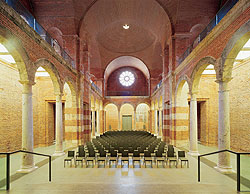
The former
Aller Heiligen Kirche-All Saints Church of the Residence in Munich
now a beauitful concert hall
Personal observations
about the profession
Experience has
revealed to me that absolutes in the world of theatre tend not to always exist.
The Lyric Art is a very personal and subjective genre and one should not expect
justice and rewards for individual efforts. Fate also seems to play a major
role in our field: one can only do one's best to be well prepared for all eventualities.
The reasons as to why one singer makes it opposed to another are of course very
human considerations still they don't necessarily bring one further in the quest
of a career. It is important to be aware and aspire towards the virtue of "Gelassenheit"
as they say in German; this is a combination of the English words: composure
and calmness. My observations have revealed that many singers who are successful
possess this quality.
Resident
visas and work permits in Germany

Before writing
these paragraphs I contacted the Australian Embassy in Berlin to obtain the
latest information regarding the rights and obligations of Australians and New
Zealanders desiring to live and work in Germany.
The web page
from the official German Foreign Office has been copied and inserted below.
Currently, Australians and New Zealanders are permitted to reside and work in
Germany under the terms of the European Economic Area, which means that
should a young singer be offered a written contract whilst staying in the Federal
Republic of Germany, a singer may apply for a resident and work visa within
Germany. It is no longer necessary to apply from Australia for these permits
before entering the Federal Republic of Germany.
Table of countries whose citizens require/do not require visas to
enter Germany Last updated 28.06.2016. The entry "yes" against a country's
name means its citizens always require a visa to enter Germany. 2) The entry
"no" against a country's name means its citizens do not require a
visa to enter Germany. Without a visa, however, they may not stay longer than
three months every half-year or take up gainful employment requiring a work
permit. Excepted are citizens of European Union member states (marked with "*").
If
required, citizens of member states of the European Economic Area and some
other countries may obtain a residence and/or work permit after entry
(these countries are marked with "**").
Country
Entry visa required no/yes
Australia (including the Cocos Islands, Norfolk Island, Christmas Island)**
no
New Zealand (including the Cook Islands, Niue, Tokelau)** no
German
Foreign Office Website HERE
Visa information for Australia / NZ HERE
and the official listing HERE
These are the
literal requirements for Australian and New Zealand citizens however I would
suggest that singers really plan their trip well in advance and do the paper
work correctly: check with the consulate in your area just to make sure the
rules have not changed. One should never underestimate just what unpleasant
surprises could be awaiting them on the other side of the counter at these official
governmental departments. A member of our consular section in Berlin related
some very unpleasant experiences he has had where ill-prepared and unknowing
Australians came to grief with the law in Germany. Germany is very different
to Australia and does not have much understanding for our easy going and uncomplicated
way of life: particularly in the area of bureaucracy.
Agents
The prerequisite
of an excellent agent-manager is paramount to having a successful career. In
Germany many agents are purely agency-contract handlers who negotiate the contracts
of new and established singers at the same time receiving a 12% commission for
their efforts. This means 12% of the gross salary in the first year of employment.
The singer pays six percent of this commission; the house pays the remaining
six percent. This is a one time fee however if your contract is for one year
only and the management decides to offer you another two year contract you are
required to pay the 12% commission for the first year of the new contract again.
Two major German agents
are Germinal Hilbert and Karl Erich Haase in Munich. These are real agent-managers
who have an entire staff that looks after the careers and contracts of leading
artists and those whom they believe will become major performers. In America
Columbia Artists is the world's leading agency. The main Austrian agents are
Raab-Böhm, Hollender-Calix and Michael Lewin. The important point to remember
is that your agent must be "pro-active you" as a successful singer
described it to me.
OPERA BASE
list of many international agents
Opera
Base
MUSICAL CHAIRS
very good website for vacant positions for singers,
musicians, producers, conductors, choir directors etc
Musical
Chairs
Some agents who will hear
beginners
please cut and paste links
Volker Piefke - www.cicada-con.de
Karin Fuger - www.theateragenturfuger.de
Barbara Guelzow - www.agentur-guelzow.de
Antonia Klein - www.agenturklein.de
Frank Langosch - Dresden AgenturLangosch@web.de
Therese Renick - www.opernagentur-renick.de
Heidi Steinhaus - http://www.heidi-steinhaus.de/
Inge Tennigkeit - www.tennigkeit-agentur.de
GERMANY
Central Foreign Artists' Recruitement Agency
ZAV
Zentrale
Auslands und Fachvermittlung
German Federal Department of Employment
Munich
Oper / Operette
Telefon: (089) 381707 - 0
Fax: (089) 381707 - 70
E-Mail: ZAV-Kuenstlervermittlung-Muenchen@arbeitsagentur.de
Major Agents
Hilbert
Artists Management
Maximilianstrasse 22
D-80539 München
http://www.hilbert.de
E-mail: agentur@hilbert.de
Telefon: +49 89 290 747-0
Fax: +49 89 290 747-90
KURSIDEM
& TSCHAIDSE & HERZL
Tal 15, D-80331 München
Tel: +49 - 89 29 16 16 61/2
Fax: +49 - 89 29 16 16 67
Austria
Michael Lewin International
Artists Management
Gluckgasse 1/1
1010 Wien
Austria
Opera4u
http://www.opera4u.com/index.php?lang=en
Hermanngasse 3
1070 Vienna
004315137592
Dr
Raab & Dr Böhm
Künstleragentur Dr. Raab & Dr. Böhm GmbH
Plankengasse 7
A-1010 Wien
E-mail: office@rbartists.at
Telefon: +43-1-512 05 01
Fax: +43-1-512 77 43
Hollaender-Calix
Prof. Ariane Hollaender-Calix
Grinzinger Allee 46/2, A - 1190 Wien
Telefon: 0043 1/ 328 47 33
Fax: 0043 1/ 328 90 70
Agents
charge a fee for the use of a pianist which will cost approximately €20-30.
The
audition process

There
have been several books written on how to audition the best being Anthony Legg's
"The Art of Auditioning". Tony Legg who is an internationally
renowned conductor and vocal coach is currently Music Director with Opera Australia.
His book is full of insight into the entire European opera scene and is a must
for the aspiring singer.
Having
gone through the audition process myself as a singer and as a member of the
panel for auditions for the Bavarian State Opera Chorus I would like to share
my experiences and observations.
Firstly:
fate again plays a major role in auditions and one should not have the illusion
that contracts in opera houses are plentiful and easy to obtain in the German
speaking world. This is often a major misconception of many young singers in
Australia and New Zealand. I'm sure that I also suffered from this fallac many
years ago in spite of the warning from my teacher Valerie Collins-Varga that
I should not expect to find a job immediately. I don't think these supposed
"golden days" ever existed in Germany, maybe just after the war with
the huge shortage of labour.
After
the collapse of the Iron Curtain in 1989 the situation became far more competitive
and this trend still shows no signs of discontinuing. To find any form of contract
today is extremely difficult and one should be prepared for the possible reality
that one's ambitions may not be fulfilled. Some may be fortunate to find something
immediately, others may have to do numerous auditions before achieving success.
The first round of agent and stage auditions, should one be fortunate to be
given them can generally prove to be a great deal of fun and inspiration. However
one should not assume that one will receive stage auditions; these are also
becoming much harder to obtain as at the current time supply greatly exceeds
demand. The second and further audition rounds can become stressful, whereby
a singer can begin to loose confidence and suffer from depression. The result
maybe the development of vocal indisposition and colds etc. This is quite normal
and I would suggest that a singer discuss such matters openly with a close friend,
family member or a singer orientated medical practitioner.
A young
Australian or New Zealand singer on the audition trail is a long way from home
should difficulties suddenly arise and often problems can be solved by talking
to someone close who is compassionate and understanding. The main point is to
prepare for a tough road ahead; our Australian attitude to life will prove to
be a great support for the adventure that awaits the aspiring singer. However
we Australians and New Zealanders should not forget that Europe is not "Down
Under", with our relaxed and easy going manner not forgetting the high
quality of life and standard of living we enjoy in a very pleasant climate.
Normally to obtain a contract in the German house system a singer does the round
of agent auditions that generally take place between September and December
of each year. I say generally, as auditions are held throughout the entire year,
however the main time is the last four months of each year. Should one be fortunate
to make a good impression on an agent the agency may then send the singer to
various houses to do stage auditions. One should be aware that in this day and
age it is extremely difficult, one could say miraculous to receive stage auditions.
It is always good to clarify with the agent exactly what the houses are looking
for so that you can sing the appropriate repertoire. Beware that the agent is
not just sending you out for an "information audition". This can prove
to be an expensive undertaking for singers on a tight budget as the rail fares
and accommodation in Germany are most expensive. One must use one's intuition
in such situations. If a house calls you back for a second stage audition they
will cover your fares and accommodation costs.
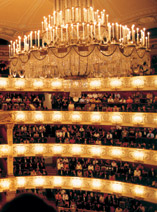
photo with kind permission of Wilfried Hösl
The
auditorium and chandelier of the Bavarian State Opera
One
should have a selection of about six mainstream repertoire arias in Italian,
English, German and French that are suitable to one's vocal abilities. An audition
for an agent or an opera house is not the time to be trying out new or overly
ambitious repertoire, unless one has been asked especially to prepare a certain
aria or role. A singer should only present the arias suitable to their voice
type that he or she can sing well in spite of a cold, sinus infection, pneumonia
or any other form of vocal indisposition.
A singer
should never audition when he or she is suffering from a serious respiratory
infection. Again, each singer must know what he or she can perform under stressful
conditions and be able to discern as to what is just a sniffle or slight head
cold and what is a full infection. No one will thank you or offer sympathy after
singing badly at an audition. The first impression generally speaking is the
lasting impression with audition panels. My suggestion is to cancel when you
are ill or see a specialist for sound and objective advice if you are still
in doubt.
Generally
speaking, you should never sing an aria if you haven't learned or at least have
the concept of the entire role. By learning the entire role you gain the insight
and depth necessary so as to command a character. The audition panel can tell
before you even open your mouth just what you can or cannot do. Somehow from
the time you walk on stage you have revealed your soul to the people listening.
I have
experienced this situation many times at the Bavarian Sate Opera where I have
often gained the impression that some singers walk on stage with body language
that says "I don't want this job, I look terrible and I have absolutely
no vocal technique, which I would now like to display to you all in my atrocious
rendition of this aria, which I can't sing."
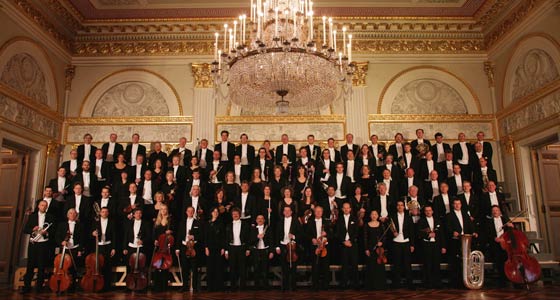
The Bavarian State Orchestra
Of
course there is the exception to the rule. I witnessed a fine singer who looking
terrible then sang the house down. Somehow she was totally confident as a person
and didn't care about the opinions of anybody. Her confidence and charisma just
radiated everywhere and the panel engaged her on the spot.
The
main aim is to be yourself and act naturally. The character you are portraying
must come from within; over exaggerated acting or emoting just looks very out
of place and really quite stupid. It is important that a young singer learn
to stage his or her audition arias with a good producer or teacher so one has
a routine that doesn't look too artificial or mannered. When one has worked
out the basic staging one can then leave room for the spontaneous in one's characterisation.
It
is important to dress well for an audition. By this I mean that one should try
to look a little like the character or vocal category for which the opera house
is looking. For example a Verdi baritone should cut an elegant and commanding
figure on stage and portray an air of seriousness. Soubrettes should really
look bright and charming with a dress that flatters their appearance and the
character they are portraying. A Spieltenor i.e., Pedrillo in Mozart's Entführung
aus dem Seral should portray a youthful character and be dressed in a smart
and casual manner. Whatever the role one should wear clothes that flatter the
figure and complexion, allowing a singer room to move without looking stiff
or awkward. Hairstyles should also highlight the face and be open so one can
see the eyes and facial gestures.

photo
with kind permission of Wilfried Hösl
View
from the Galerie of the Bavarian State Opera
Another
hurdle to watch is the standard of accompanying in opera houses. The agents
on the Continent normally have good pianists as do the bigger houses however
be prepared for anything in the B, C and D houses of Germany, Austria and Switzerland.
I had the pleasure of watching a singer so incensed by the disgusting standard
of playing that she pushed the appalling pianist to the side and accompanied
herself! She happened to be an Australian and several singers then asked her
if she could play for their audition at a professional rate. Auditions in the
provincial houses of Germany are often not punctual. I found the audition process
in England to be professional, courteous and punctual, the standard of accompanying
was also very high.
The
arts is often a very subjective genre and it is important not to be upset or
put off by peoples' comments after auditions. Often language difficulties can
create a wrong impression if one of the panel offers you criticism in either
very direct German or inferior English. One can experience the case where members
of the audition panel expound their personal views and criticisms in spite of
an inadequate knowledge of music, opera and the vocal art. This can happen when
certain types of directors sit on an audition panel who sometimes tend to have
a negative disposition towards singers.
The
important point to remember is that one should be one hundred percent prepared
musically and vocally before embarking on the audition trail. An equally major
part of vocal education is the building of self-confidence: without this quality
all is in vain. During your time of study, work out your aims and pursue your
goals with conviction together with your teacher. You must radiate confidence
in an audition as this will transmit itself to the panel as soon as you set
foot on the stage.

Staatstheater
am Gärtnerplatz - Gärtnerplatz State Theatre Munich
this house performs all operas and operettas in German
Health Tips during the
audition period
Firstly
apart from a healthy diet and a good and restful sleeping pattern one should
drink at least two litres of fluids daily. The Continental climate is dry, unpredictable
and harsh north of the Alps and even though it seems to rain more than in Australia
and NZ, the humidity levels are often quite low. This is not good for singers
who need a room humidity level of 65%-80%. Winter for Australian and NZ standards
can extend to seven months of the year here, which can also make one feel depressed
at times. Keeping the mucus membrane system moist is paramount as the internal
heating systems cause dryness which then leaves the singer susceptible to colds
and infection.
In
the winter months I would suggest dressing warmly so that when indoors one can
take layers of clothing off. Thermo- underwear is good if you are going to do
a lot of outside hiking or skiing, it is not really necessary for normal living.
One should never sleep with the internal heating on and preferably with a window
slightly opened. The weather during the European spring from April till June
is very changeable in temperature, one should always have a warmer jacket at
hand even though the day may be quite hot. It is mostly cool in the evenings
which is very pleasant especially for a good nights sleep.
Hay
fever is also very harsh for many singers and the time period extends from the
beginning of February right through to late July and August. A singer should
consult a specialist immediately should he or she experience difficulty as chronic
and acute hay fever can completely debilitate a singer and if not treated correctly
can lead to further respiratory illnesses such as chronic asthma and bronchitis.
Hay fever can also be treated successfully through various forms of immunisation.
In
Germany, in the case of dryness one can buy Bepanthen nose cream (Euro$3.00)
along with Bepanthen anti-inflammatory and swelling inhalation solution(circaEuro$7.50)
which one can combine with Mucolsovan inhalation solution (circa Euro$5.00)
which is an excellent and harmless decongestant. These can be inhalated through
the Macholdt glass inhalation pipe (Euro$25.00): an excellent product from the
former German Democratic Republic. Finally by rinsing out the nose and sinuses
with the Rhinocare plastic bottle (Euro$15.00) or simply with warm water in
a glass combined with a level teaspoon of sea salt when one feels a cold coming
on, one can often get the situation under control quickly. All these products
were recommended to me by my specialist and are harmless. Bepanthen is basically
the cream mothers use against baby rash. All these articles are available at
most pharmacies (Der Apotheke).
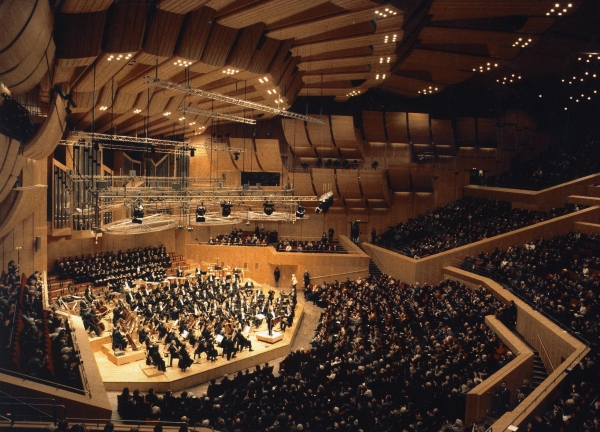
Philharmonie
am Gasteig
Munich's biggest concert hall and home of the Munich Philharmonic Orchestra
Suggested
course of action for those planning the German/Austrian audition tour - some
thoughts for consideration
Start
to make a plan at least one year in advance to be ready for the German /Austrian
audition period of September to December.
Remember
to read the section in this story on visas and work-permits in Germany for Australians
and New Zealanders.
Do
a language course in German at the Goethe Institute or similar institution at
the beginning of the year of your departure. Really concentrate on getting the
language into your system and throat. German is a great language to sing and
speak. Read children's books like Max und Moritz or Der Struwelpeter. These
are a helpful and entertaining way of learning to read and speak in German.
Make
sure you have the standard arias from the German repertoire learned before you
leave Australia.
Remember that you will
need at least 2000 Euro per month to cover travel costs, rent, food, singing lessons
and or coaching sessions should you be planning to stay for several months. Singing
lessons range anywhere from 40-100 Euro, coachings now cost approximately 45-60
Euro. (Currency converter here)
Try
and save as much as possible and see what you can organise in relation to scholarships.
Buy a Eurail Pass in Australia or NZ. One can only purchase this pass outside
Europe. The "Deutsche Bahn" is terribly expensive and no longer has
the number of "specials" it used to have. For example the trip Munich-Frankfurt
return costs 150 Euro in the economy class. Try and only use your train pass
for the long trips.
If
you win a language scholarship see that you can study in a major city with an
international opera house and concert halls such as Munich, Berlin or Hamburg.
It is most important to see and hear as much as you can. This also applies to
the art galleries and museums. At the theatre one can always obtain cheap standing
room tickets or "Stehplätze".
Plan
to arrive for a language course by the end of May. This way you can acclimatise
and feel your way into a new country so that by September you will be able to
communicate adequately and be used to your new surroundings, e.g., becoming
used to the transport system. One needs time to adjust to the different culture,
lifestyle, climate and language. I have experienced many Australians who thought
they could just get off the plane and go auditioning. That may work for some
however I know of several cases where young singers have really fallen apart
and felt totally lost in a strange environment. It is always good to allow time
so that your system can absorb all these new experiences. This way you will
also be able to perform better. I found my first months in Germany especially
during the audition and competition period totally inspiring and challenging.
Let's
Go Europe will give you the addresses of inexpensive hotels and pensions which
cost anywhere between Euro$45-75 per night. Try and get something in the city
centre that is relatively close to the opera house and always ask for a room
"hinter Hof" i.e., facing the back courtyard and not on the main street.
It is most important to sleep well during the demanding and challenging audition
period.
You
must write to the agents by May to obtain an audition for the following September,
either from Australia or simply contact them in Germany should you arrive early
enough. Some are now on line and can be contacted per email, however a proper
CV and photo should be sent by post. Your biography should be in German, well
presented and concise including a normal size colour photograph for publicity
purposes. See if you can record a few arias during your time of preparation
on a digital recorder that one can then burn on to a CD on a computer. This
is a relatively simple exercise these days with a small compact digital walkman
and microphone. There is nothing more stressful than getting a recording together
in a rush: one needs time and patience to produce something artistic and worthwhile.
Viel
Glück!

photo
with kind permission of Wilfried Hösl
The
Bavarian State Opera Munich
The
importance of oratorio and related styles in the cultural life of Europe:
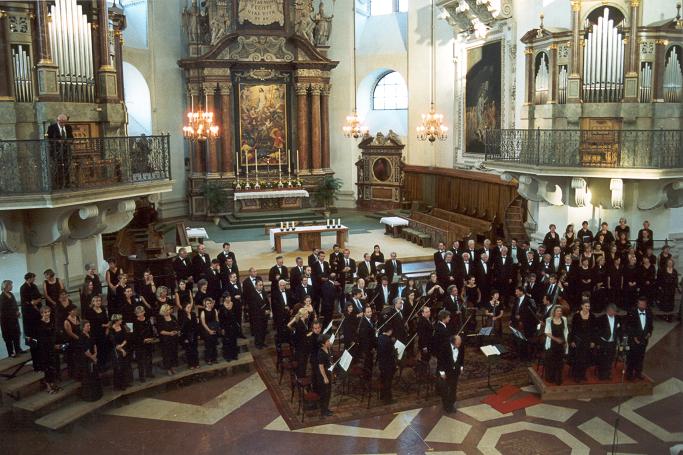
Salzburger
Dommusik - Salzburg Cathedral Choir and Orchestra
Director: Domkapellmeister Janos Czifra
Choral life flourishes in Germany,
Austria and Switzerland. Every normal sized village has at least two choirs
for men and women and two brass bands. Oratorio is an intrinsic part of culture
particularly in Germany and Austria. In my ten years of professional engagements
I have only sung to packed churches and concert halls irrespective of the season.
It is in this form of music that young European singers learn and absorb the
Continental style i.e., noble, smooth and round singing with an excellent legato.
In cities such as Munich, Salzburg,
Stuttgart, Hamburg and Vienna the number of professional performances that take
place is large which are basically scheduled according the Christian calendar.
Sacred music especially in the form of orchestral masses and cantatas play an
important role in the liturgical and cultural life of many middle to larger
cities.
For singers who find themselves
in the northern parts of Germany, the emphasis is strongly directed towards
the great Protestant composers such as J. S. Bach, H. Schütz, G. F. Telemann
and Brahms to mention only a few. In the southern areas both the "Süddeutsche
Meister" are performed i.e., Mozart, Haydn, Beethoven (Die Wiener Klassik)
and Schubert, along with the Protestant composers already mentioned. As a result
of the huge displacement of people caused by the effects of World War II, the
traditional religious borders have changed considerably.

Kollegien
Kirche Salzburg
a major oratorio and concert venue especially for the Salzburg Cathedral Choir
and Orchestra
Suggested
introduction to ensemble singing through oratorio and related styles
The orchestral masses and other
liturgical settings i.e., litanies and vespers of Haydn, Schubert, Mozart and
Beethoven, are also regularly performed in a professional context within the
liturgy on Sundays and major feast days and also in concert; both in churches
and concert halls of many medium to large cities in Southern Germany and Austria.
It also is interesting to note that a church musician as either conductor or
organist is a full-time career in the German speaking nations.
These masses and related works
have very beautiful solos for all voice categories. The solo ensembles in these
works e.g., Benedictus and Et Incarnatus est present the opportunity for young
singers to learn how to sing in ensemble concentrating solely on pure, noble
and well balanced vocalisation. I am convinced this is a better way to begin
learning how to sing in the various styles: baroque, classical and romantic,
than first attempting ensembles from operas of these periods. The majority of
solos from masses are challenging but never too long or overtaxing (there are
some exceptions) for a young singer.
The use of orchestrated masses
and other liturgical works of the classical and romantic periods to gain the
essential orchestral experience and routine necessary as a soloist and ensemble
singer.
The mass and liturgical repertoire
of W.A. Mozart, Joseph Haydn and Franz Schubert, is an ideal way to give young
singers the essential experience of singing with an orchestra as a soloist and
in ensemble. All that is needed to perform this repertoire is readily at hand
in a conservatory. This could also be a solution in gaining orchestral experience
should it not be possible to stage a Mozart opera or main-stream oratorio as
well.
The average young German singer
upon graduation usually has most of the repertoire of oratorio, masses (particularly
in Bavaria and Austria), cantatas and related styles learned and performed on
a professional basis. It is also in this field that young singers learn routine,
sight singing, ensemble singing: basically everything they need for a well-rounded
musical formation as they enter the profession.
This repertoire is also part and
parcel for orchestral musicians in Germany and Austria. The majority of players
in the Bavarian State Orchestra and the Mozarteum in Salzburg, all have their
positions in the ensembles of the bigger churches in Munich and Salzburg. Maestro
Zubin Mehta told me that he played in orchestras on Sundays in Vienna for years
as a student and learned all the repertoire needed for this field which he regularly
conducts today. Many players also form their own private ensembles (e.g. Ensemble
Lodron from the BSO), which provide the opportunity for the large number of
excellent amateur choirs to perform big oratorio concerts on a professional
basis.
The majority of young singers in
Australia tend to have a very limited number of works in their repertoire apart
from compositions such as Händel's Messiah and the St John Passion. I believe
that we can learn from the German tradition in this regard which would enable
us to develop a rounder and more elegant art of vocalisation before we plunge
into the study of opera. It is also essential repertoire of great depth and
beauty that will enrich us as artists.
I would suggest that a conservatory
perform this repertoire (including the masses and other liturgical works at
least twice a year) in conjunction with the Christian calendar i.e., a passion
during Lent, a Christmas Oratorio at Christmas and a requiem during November
etc. This will benefit the orchestral players at an institution as well and
equip them with essential repertoire should they plan on going to Europe.
It is a good idea to familiarise
oneself with the standard repertoire in the original language according to one's
voice type during formal studies in Australia. There are many pieces that can
be shared by basses, bass-baritones and baritones, so one should not be disturbed
that the word bass is always used in the voice-part descriptions of many works.
Pieces such as Ein deutsches Requiem of J. Brahms and Fauré's Requiem
explicitly call for a baritone voice. The works of Bach when performed at A440
pitch tend to sit quite high for a bass and often require a baritone even though
the word bass appears in the vocal score.

The
Abbey Church of Fürstenfeldbruck
taken during a performance of Haydn's
The Creation in 1991
Suggested
basic repertoire
Composer
and Work
J.S. Bach Christmas Oratorio
St John Passion
St Matthew Passion
B Minor Mass
Magnificat in D major (Also the major solo cantatas for solo SATB)
Composer Work
C.
P. E. Bach Magnificat
G.
F. Händel The Messiah (German and English)
Dettingen Te Deum
W.
A. Mozart Requiem
C Minor Mass
Exutate Jubilate
All masses in particular the Coronation Mass and Missa in C KV 337
J.
Haydn The Creation
The Seasons
All orchestral masses
F.
Mendelssohn Elijah
St Paul
Lobgesang
A.
Dvorak Stabat Mater
Requiem
G.
Fauré Requiem
M.
Duruflé Requiem
J.
Brahms A German Requiem
C.
Orff Carmina Burana: a major secular concert repertoire work
(in classical Latin not church Latin)

Cuvilliés-Theatre
Munich
Mozart's opera Idomeneo received its world premier in this theatre
Which singers stand a
better chance of making a career?
Specialist careers in certain repertoire
and roles such as a coloratura Sop and Mezzo Sop if you have an outstanding
talent. Dramatic voices in all categories. A real schwarzer Bass -black dramatic
bass and Helden/dramatic tenors. All these voice types are very rare.
How
old should you be to start auditioning for an operatic career?
This depends upon when one finishes
one's studies. I would suggest starting immediately after a completed course
of study. For lyric voices one should do their best to find an engagement before
the age of thirty. For the rare dramatic voices the age limit is far more flexible.

Stadttheater
Augsburg - Augsburg City Theatre
What
is the usual vocal-career life span for all the voice categories especially
female voices and lyric voices?
Once again this is varied. The
very light voices need to find an engagement well under thirty and generally
speaking can look forward to a career of up to fifteen years. This does not
mean their voices are finished. It is much cheaper for the management to get
a relatively inexpensive graduate than an experienced artist who is ten years
older. It gets tough for light lyric/soubrette sopranos and mezzos after the
age of thirty to thirty five.
Tenors who remain lyric can expect
to make it through till they are forty-five. It is hard to really define things
in this regard one can only speak generally. If a tenor has a lyrico-spinto
or dramatic voice or is a German heroic tenor then he has much better chances
of finding engagements and having a singing career into his early sixties. The
same goes for the big bass voices. Baritones who can sing Verdi and Wagner also
stand a good chance at having a long career. The lighter voices in these categories
also can have difficulties finding permanent engagements after thirty-five.
It is sad to experience singers who are looking for engagements around the forty
mark who don't really have a chance of finding something permanent again, especially
if they have family commitments.
The dramatic voices are simply
a very different kettle of fish. The career of the distinguished Australian
soprano Elizabeth Whitehouse started quite late. There is no age limit for such
voices as they are so rare managements are delighted to have you on their books
generally speaking. Everybody's fate is different; one has to trust one's instinct
and judgement in these matters. I know of singers who started a successful solo
career after fifty.
What does a singer need to maintain
a major international "A" house guesting career singing Verdi, Wagner,
Puccini and Strauss etc., or a good "A-B" house career in major roles
in major repertoire?
The appropriate big, resonant and
solid voice required for this repertoire. Rock solid reliability as a musician.
A healthy and a robust constitution. To have a high level of consistency in
performance no matter what obstacles present themselves. One must be able to
really stand up and deliver at least three times per week in the major houses
of the world.
For example, the famous Austrian
bass Kurt Rydl sang the role of Pope Pius IV in Pfizner's Palestrina at Covent
Garden. He caught the first flight to Hamburg the next morning to be in time
for the 10am general rehearsal of Boris Godunov at the Staatsoper. He then flew
to Munich late that afternoon to sing Ramphis in Aida that evening at the Bavarian
State Opera! The next morning he flew back to Hamburg for the premier. "Kurty"
apart from being a delightful colleague and a total character, is an absolutely
amazing artist.
Another invincible and impervious
artist is the Italian baritone Paolo Gavanelli. He can sing Rigoletto on Monday
in Vienna, fly to Munich the next day for Macbeth, then off to Berlin for Germont
etc., all without blinking. In a recent conversation Paolo related to me what
the outsatnding baritone Giuseppe Taddei said to him some years ago. "For
a major career you need a good technique, good nerves and good health!"
These are two true stories without exaggeration. I have witnessed such feats
with these two fine artists on stage and in rehearsal regularly.
The ability to work amiably with
producers, conductors and colleagues in an ensemble is also necessary. The virtue
of composure that is required during the long rehearsal phase of a new production
and all the stress caused by travelling and living in hotels.
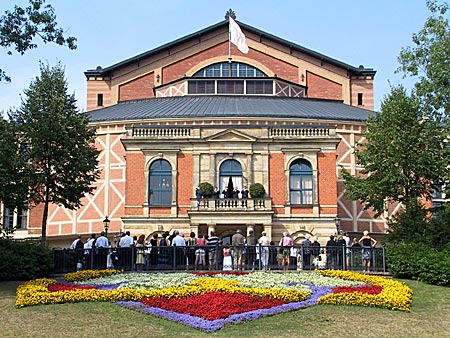
Das
Festspielhaus Bayreuth - Bavaria
Types
of career possibilities in Europe
Major
"A" house international career any where from 5-15 years singing major
roles in big repertoire:
Verdi, Wagner, Strauss and Puccini.
Respectable international circuit
career in "A" houses singing lighter repertoire:
E.g. Baroque, Classical and Early
Romantic composers also contemporary music.
German 'B' house guest contract
career in major repertoire anywhere from 5 -10 years:
Verdi, Puccini, Wagner and Strauss.
German
'B, C & D' house career on a two year contract that may extend indefinitely
culminating after 15 years into a tenured contract as resident soloist in either
major or minor repertoire:
A tenured contract is something
very rare and almost impossible to receive in this day and age. For example
Susanne McCleod in Münster. Susanne, a fine mezzo-soprano, who is a graduate
of Sydney Conservatorium, deserves to have her name registered in the Guinness
Book of Records under the chapter "Unbelievable feats in the world of opera!"
She has survived something like four to five Intendants in the one house. Her
case is a rarity: legally a singer has to be informed by the 31st of October
in the thirteenth season that the contract will not be tenured.
German
B, C & D house 2-year contract which then can be terminated or extended:
With a two year contract that will
not be extended, a singer has to be officially informed before the end of the
first season. Then a singer can begin to look for a position for the season
after his second year. This is the most common form of contract and a most stressful
form of occupation: particularly for those singers with family and marital commitments.
A two year contract in such a house
is better suited for single artists and generally one can hope for a career
life span from two to four years. If you haven't progressed into bigger houses
or had the good fortune to be discovered you are normally in the situation of
being unemployed after the first two to four years.
In the season the Bavarian
State Opera founded a new young artists program on the initiative of music director
Kent Nagano - the Opera Studio. This program supports highly talented young
artists and prepares them for an international career in step with actual practice.
Now under the new general manager Nikolaus Bachler this promotion of young artists
continues to play an important role in the success of the Bavarian State Opera.
The Opera Studio program
runs one to two seasons and consists of role studies, vocal lessons, acting
and movement classes as well as language training. The young artists are cast
for small roles in productions on the main stage and take part in several concert
projects. They also work together with professional singers and conductors and
have the opportunity to attend main stage rehearsals and performances. Workshops
with staff members from different departments of the Staatsoper on subjects
like career development complete the training program.
In addition, the Opernstudio
members study and perform one complete opera each season. The past two seasons,
Mozart’s Così fan tutte and Gioachino Rossini's La Cenerentola
were premièred at the Cuvilliés Theatre.
The members of the Opera
Studio are employed through the German union contract (NV Bühne) and are
paid the corresponding entrance salary. For performances in productions on the
main stage, members receive an additional flat-rate fee depending on the size
of the role. The Bavarian State Opera reserves an option for future engagement
of the young artists into the ensemble of the Bavarian State Opera.
The Opera Studio is
supported by
Erika Kaufmann and Rolf and Caroli Dienst, Vera and Volker Doppelfeld-Stiftung,
Freunde des Nationaltheaters e.V., Dr. Joachim Feldges, Dirk and Marlene Ippen,
Marco Janezic, Hildegard Manchot, Nachmann Rechtsanwälte, Eugénie
Rohde, Stadtsparkasse München, Dr. Kurt and Chiona Schwarz, Dr. Martin
and Eva Steinmeyer
Application
Singers of all nationalities
at the beginning of their career can apply for the Opernstudio. The
age limit at the time of the application is 28 years for
female and 30 years for male applicants.
As application materials
the artists need to send in:
- a CV (including the
date of birth)
- a photo
- a recording of 3 arias or songs, one of which should be by Mozart and if possible
one in German
Closing date for applications
for the 2011/2012 season is November 30, 2010. The audition for selected candidates
will take place presumably in January 2011.
Please send your application
to:
Opern Studio
Bayerische Staatsoper
Tobias Truniger
Künstlerische
Leitung
Pina-Teresa Killer
Organisatorische Leitung:
Max-Joseph Platz 2
80539 München
Tel 089 / 2185 - 1046
Fax 089 / 2185 - 1003
opernstudio@st-oper.bayern.de
OPERA STUDIOS IN EUROPE
WITH PAID LIVING ALLOWANCE
please cut and paste links (Anita Kyle gratefully acknowledged
for providing us with these helpful links)
•
Staastoper unter den Linden, Berlin
• Internationales Opernstudio, Zurich http://www.opernhaus.ch/d/akademie/ios/opernstudioios_engl.php
• Internationales Opernstudio Nuernberg http://www.staatstheater-nuernberg.de/inhalte/index.php?menu=105
• Opernstudio Graz http://www.buehnen-graz.com/oper/ensemble.php?bereich=13
• Das Internationale Opernstudio der Hamburgischen Staatsoper http://www.hamburgische-staatsoper.de/0_english/2_state_opera/frameset_state_opera.php
• Internationales Opernstudio Koeln http://www.buehnenkoeln.de/opernstudio_bewerbung.php
• Opernstudio, Oper Frankfurt http://www.oper-frankfurt.com/index.cfm?siteid=239
• Junges Ensemble Rheinoper, Deutsche Oper am Rhein, Duisburg http://www.rheinoper.de/de/inhalte/oper/75.aspx
• Flanders Opera Studio, Genf, Belgium http://www.vlaamseopera.be/en/operastudio_intro.orb
• Internationales Opernstudio, Theater Bremen
• Accademia di perfezionamento per cantanti lirici del Teatro alla Scala
di Milano http://www.accademialascala.it/index.php?option=com_content&task=view&id=26&Itemid=63
• Atelier Lyrique, Opéra national du Paris http://www.operadeparis.fr/cns11/live/onp/site/lopera/atelier_lyrique/presentation/index.php?lang=en
• Opera Studio Nederland, Amsterdam http://www.operastudio.nl/
• Jette Parker Young Artists Programme http://www.roh.org.uk/workhere/jpya.aspx
• L’Opéra Studio National du Rhin, Strasbourg, France http://www.operanationaldurhin.fr/EN/voix/jeunesvoix/index_jeunesvoix.php
Career as a chorister
in a major "A" international house
Photo with kind permission of Wilfried Hösl
The
Chorus of the Bavarian State Opera
Many good soloists especially
those whose family commitments take priority, look for "A" house chorus
positions when they realise their solo career for whatever reason has plateaued.
Moving constantly every two years and living with the permanent worry of the
possibility of becoming unemployed is not to be recommended. In this case one
should try and find a good "A" house chorus before one reaches 40.
There have been cases when people over forty have been hired but this is extremely
rare.
Munich, Dresden, Hamburg, Berlin,
Stuttgart, Zürich and Vienna are examples of major houses in German speaking
countries. These positions are extremely difficult to obtain. Vacancies mainly
occur as members of the chorus retire, die or resign - which is rare. A sideline
solo career is possible in concert and oratorio as negotiated with the choirmaster.
Normally 35 is the age limit for permanent contracts in choruses, however this
can be flexible if the singer has his choral repertoire down or is doing an
interchange e.g., moving from say Wiesbaden to Munich. If a singer over 35 displays
a high standard of singing and musicianship skills there can be a concession
made. Accent free command of the German language required when sung. Three arias
should be sung from your operatic voice category in German and the main operatic
languages; aural and sight-reading tests take place as well.
Career
as a chorister in a B, C & D house
For example, Bremen, Wiesbaden,
Augsburg and Regensburg. These positions are, relatively speaking, easier to
obtain however not to be underestimated as the requirements are the same, the
competition is fierce and to obtain a contract anywhere these days is extremely
difficult.
Career
as a chorister in a Rundfunk Chor (Radio Choir)
Chor
des Bayerischen Runfunks- Bavarian Radio Choir
Such as the Bayerischer Rundfunk
Chor: the best in Germany. These positions are extremely difficult to obtain.
The age limits as advertised for vacant positions in various music magazines
are fixed and inflexible. Rundfunk choirs may alter their rules from time to
time depending on the actual needs of the individual choir. Currently the age
limits for the Bayerischer Rundfunk Chor are: sopranos 32, mezzos 32, tenors
30, basses and baritones 35.
The audition process is difficult:
you have to obtain a simple majority i.e., 50% of the votes of the entire choir.
Each member is entitled to vote and candidates are required to audition in front
of the choir director and the entire choir. Great emphasis is placed on the
sight-reading test and aural test. Rundfunk choirs have set audition pieces,
a list of which can be obtained upon application. Accent free command of the
German language when sung is also a major requirement. There are six major Rundfunk
choirs in Germany: these positions are regarded as prestigious and the competition
is fierce.
Preparation
for life in an international opera house
Virtual
Tour of the Bavarian State Opera
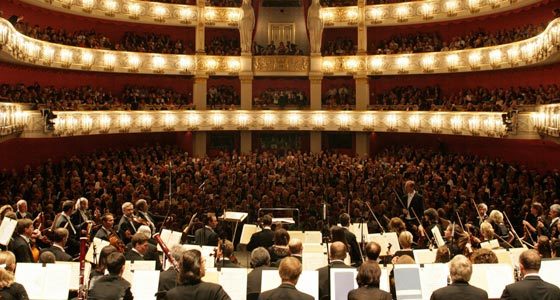
Bavarian
State Opera Munich
Many young singers coming
to Germany have been unprepared for what awaits them in Europe, especially the
demanding routine of singing in an opera house six days per week: not to mention
the difficult climate and stressful lifestyle living in a geographically small
country of 85 million people. This is of course understandable, however such
topics as the daily routine in a major house could be included during the course
of studies. The points below are a suggestion.
a.
Working and relating harmoniously with colleagues and staff in the dressing
room and onstage.
b. How to work with conductors and the music staff.
c. How to work with a production team during blocking rehearsals.
d. The routine necessary at the final phase of production calls, stage orchestral
rehearsals, piano dress rehearsal- final rehearsal (Schlußprobe), the
Sitzprobe, main rehearsal (Hauptprobe) and general rehearsal (Generalprobe).
Photo
with kind permission of Wilfried Hösl
A: Working and relating harmoniously with colleagues and staff in the dressing
room and onstage
Fitting into the daily routine
of the workplace in all careers is not always an easy task especially in the
theatre which seems to attract people with very artistic, emotional, strong
and at times unpredictable personalities. There will never be perfect harmony
and co-operation in any career where individuals a gathered together; this is
just part of the human condition.
Respect, acceptance and courtesy
are three words which could help the young artist adjust to working with so
many people from different backgrounds and nationalities and assimilate into
the daily routine of an opera house. If one concentrates on developing these
virtues one should be able to fit into a company without great difficulty.
An opera house is made up
of many parts and no part is greater than the whole. The opera house is not
purely the singers, orchestra and conductors. For the house to function many
people of varied talents are required. This starts with the porter at the stage
door and continues to the management staff, wardrobe mistress/master, the staff
in the costume department, the stage manager, the evening producer, the props
master/mistress, the stage crew, the cleaning staff and many more.
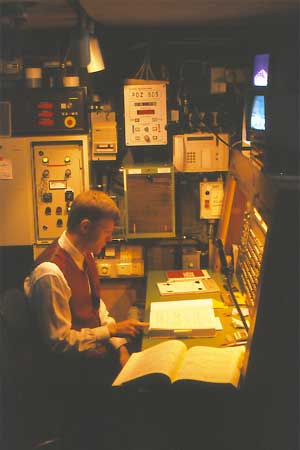
photo
with kind permission of Wilfried Hösl
Rupert
Meyer one of the stage managers at the Bavarian State Opera
All these people are the heart
and soul of an opera house, some of whom have spent their entire working lives
in devoted service to the company. It is important to get to know as many colleagues
as possible and greet them by name and show them gratitude when they are able
to assist you in any way. For example when you are about to enter the stage
and you remember you have forgotten part of your costume and you don't have
time to race back to the dressing room to get your gloves, hat or whatever.
The stage manager will always put a call through to the dressing room and your
dressing room assistant will race to the stage with the forgotten prop or article
of clothing. These types of incidents occur daily in the house.
Please, may I, and thank you
help enormously in making a happy work atmosphere in an opera company.

photo
by Wilfried Hösl
The
Bavarian State Opera

© Terry Linke / DG Dirigent Zubin Mehta
Zubin
Mehta
General Music Director of the Bavarian State Opera
1998-2006
B:
How to work with conductors and the music staff
The best way to get on with
conductors, coaches and members of the music staff is to always be 100% prepared
for coachings, rehearsals and performances. This means having your work thoroughly
memorised.
Go with your ideas but with
an open mind in matters of interpretation and be prepared to try something different.
If you then find you can't do something that the conductor wants then inform
him/her of your difficulty in a courteous but definite manner.
Unless a singer is genuinely
sick, one should always sing out at the important "musical calls"
with the conductor, especially the stage orchestral rehearsals and the main
and general rehearsals with the orchestra. It never goes down well with the
colleagues when someone is not pulling their weight in these rehearsals and
it causes a very negative atmosphere for all concerned.
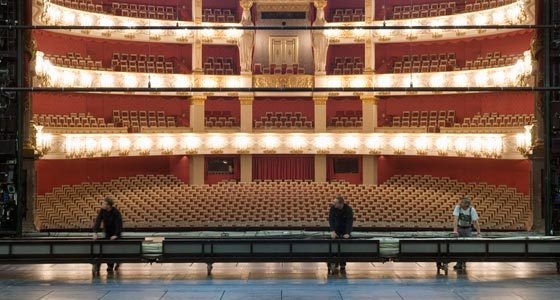
photo
Wilfried Hösl
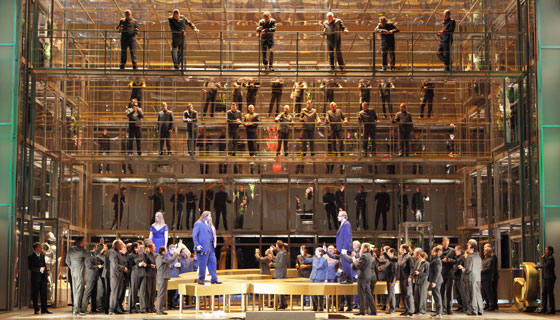
Götterdämmerung 2012-2013
Anna Gabler (Gutrune), Stephen Gould (Siegfried),
Iain Paterson (Gunther), Chorus und Supernumeraries

Generalprobe - General Rehearsal of
Gaetano Donizetti's L'elisir d'amore
Dezember 2009 in the Nationaltheater
photos
by courtesy of Wilfried Hösl
C:
How to work with a production team during blocking rehearsals
A constructive and harmonious
relationship with the producer/director and his/her team over the long rehearsal
period is absolutely essential. Basically the points in the previous section
apply here as well.
If a singer comes totally
prepared and the role thoroughly memorised one can then concentrate on the demands
of the producer and get the staging set without over singing and straining the
voice.
It is advisable that singers
note all movements and gestures in the score during the breaks or after rehearsals.
Stage rehearsals are totally exhausting and concentration and calmness are the
key words in surviving this long period. Learning staging and movements quickly
is a big advantage as it means precious time is not wasted and unnecessary repetition
will be avoided which is very irritating for all the colleagues on stage.
The aim of a rehearsal period which can last anywhere from three to six weeks,
is to build up and be fresh for the climax that should be the night of the premier.
Unfortunately today this is not always the case where quite often the leading
soloists are over tired and stressed out.
In the major houses most international
producers never insist that a singer "sing out" in every stage rehearsal
especially in the "blocking" phase.
D:
The routine necessary during the blocking period and for the final phase of
production calls, stage orchestral rehearsals, piano dress rehearsal- final
rehearsal (Schlußprobe) the Sitzprobe, main rehearsal (Hauptprobe) and
general rehearsal (Generalprobe)
(a)
Come to the first rehearsal with the role totally memorised, a positive attitude
and open mind regarding interpretation.
(b)
When a scene is finally "blocked" you can then sing the act, scene
or number in full voice and with movement.
(c)
When the stage rehearsals are really rolling and big sections of the opera are
set, you should "sing the role in": particularly if the role is new.
This will also make the production crew feel at ease as they will realise that
"you can do it!". If the production team still needs to repeat a scene
or act continually, then it is time to "mark" or not sing out.
(d)
In the "Schlussprobe" also called the "Klavierhauptprobe"
or as we would say then final piano dress rehearsal it is advisable not to sing
out as this rehearsal is more a technical rehearsal for lighting, costumes and
sets etc.
(e)
Unless one is indisposed you should sing out in the "Sitzprobe" i.e.,
the seated rehearsal with orchestra and also for the "Hauptprobe"
or the main fully staged rehearsal with orchestra and the "Generalprobe"
or dress rehearsal.
It is important to have
sufficient rest during the rehearsal period. Sleep and no singing is essential
especially in the period between the morning and evening rehearsal. After a
season in the theatre one will find that the period between 1pm and 4pm is the
wind down time for singers. A good sleeping pattern is the best cure for a tired
voice and body.
Finally, common-sense,
good judgement and the advice of a trusted mentor are the essential factors
should a singer have problems or an illness during this phase of the production.
Conclusion
The
purpose of this article has been to be of assistance and interest to a young
singer at the threshold of a career.
My hope is that the thoughts
and suggestions contained within this article will enable a young singer to
develop a positive and constructive attitude at the beginning of their quest.
Copyright. Updated: Martin Cooke. Munich, 26.06.2024






















